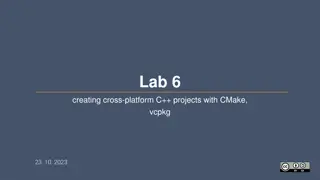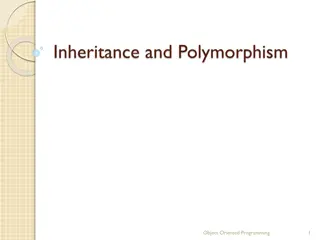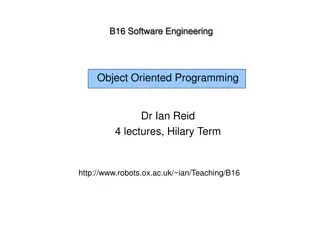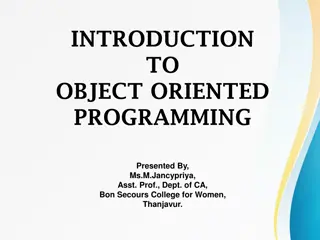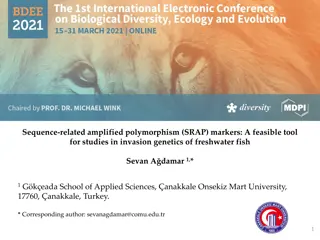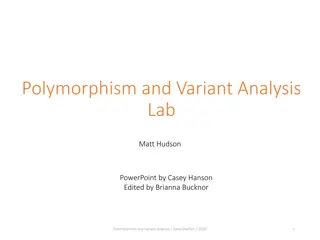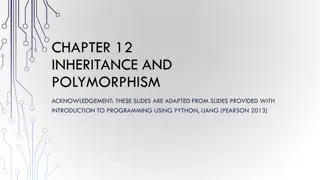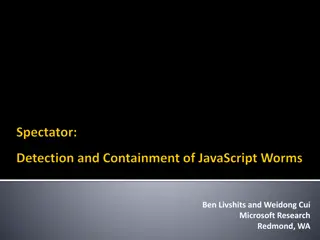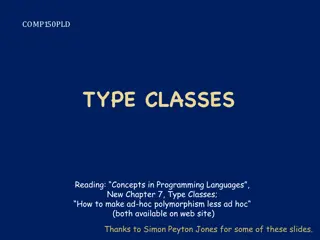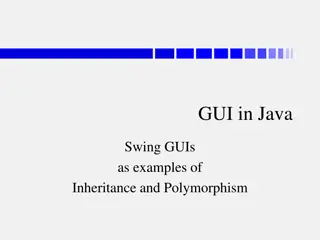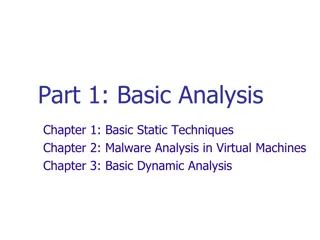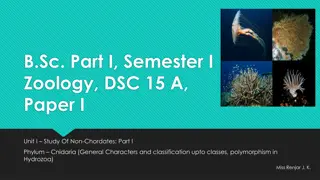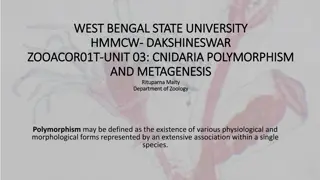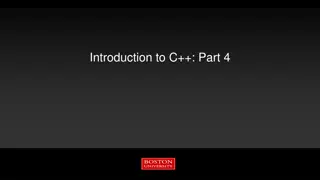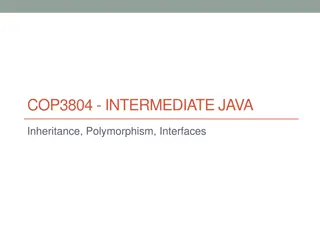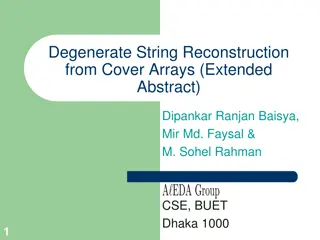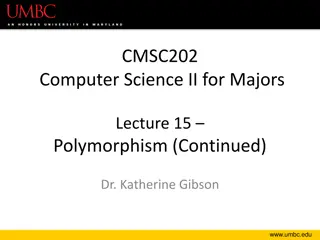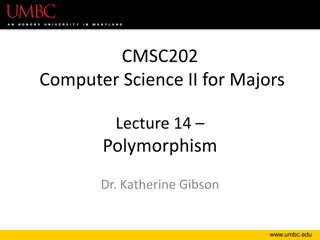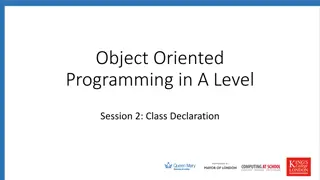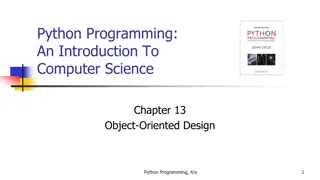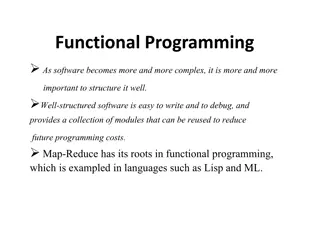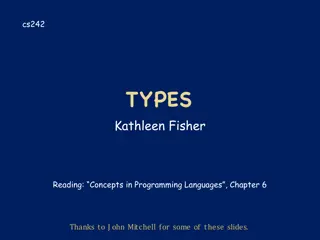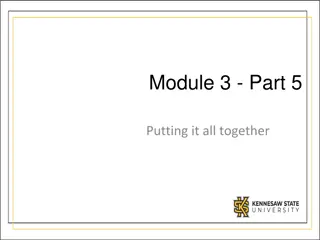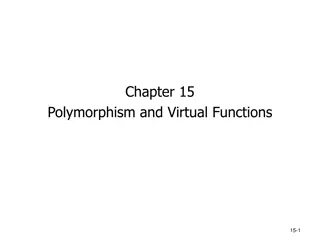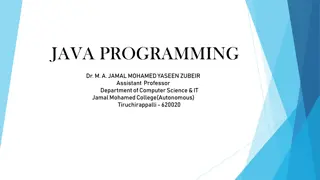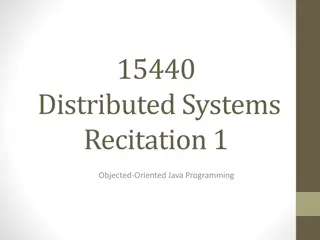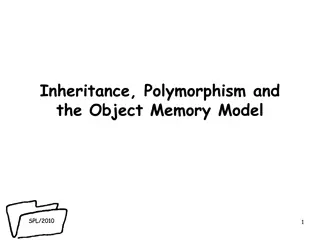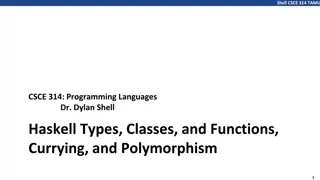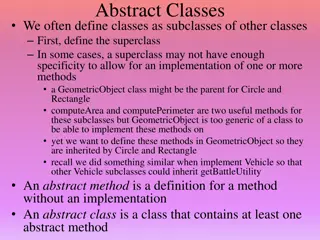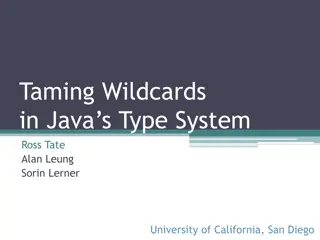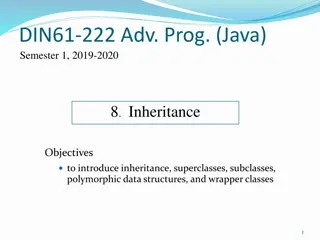Cross-platform C++ Development with CMake and vcpkg
Explore the process of creating cross-platform C++ projects using CMake and vcpkg. Learn about the motivation behind build and meta-build systems, the usage of CMake for project configuration, the significance of cross-platform dependency managers like vcpkg, and how to integrate CMake with vcpkg fo
7 views • 36 slides
Comprehensive C++ Programming Certification Course Overview
Dive into the world of C++ programming with this certification course! Enhance your knowledge of C++ language features, object-oriented programming, problem-solving techniques, and more. Explore topics like arrays, loops, inheritance, polymorphism, and error handling. With 40 hours of content coveri
2 views • 9 slides
Understanding Inheritance and Polymorphism in Object-Oriented Programming
Inheritance in object-oriented programming allows the creation of new classes derived from existing classes, promoting code reuse. By extending a general superclass to specialized subclasses, developers can model different entities efficiently. However, it's crucial to understand when to use inherit
1 views • 61 slides
Object-Oriented Programming in C++ with Dr. Ian Reid - Course Overview
Dive into the world of object-oriented programming with Dr. Ian Reid's course on C++. Learn about classes, methods, inheritance, polymorphism, and design patterns. Understand the principles of OOP and how to implement them using C++. Enhance your skills in data hiding, encapsulation, and templates.
3 views • 78 slides
Understanding Object Oriented Programming (OOP) Principles
Object-Oriented Programming (OOP) is a software design approach where programmers define data structures and operations. Key principles include objects, classes, data encapsulation, inheritance, polymorphism, and data abstraction. OOP allows for better organization and reusability of code, fostering
0 views • 15 slides
SRAP Markers: Feasible Tool for Invasion Genetics of Freshwater Fish
Molecular tools, like Sequence-Related Amplified Polymorphism (SRAP) markers, play a crucial role in studying invasion genetics of freshwater fish. SRAPs offer a reliable and efficient way to assess genetic diversity and variations in non-native species, aiding in population genetics studies of inva
1 views • 5 slides
Polymorphism and Variant Analysis Lab Exercise Overview
This document outlines a lab exercise on polymorphism and variant analysis, covering tasks such as running Quality Control analysis, Genome Wide Association Test (GWAS), and variant calling. Participants will gain familiarity with PLINK toolkit and explore genotype data of two ethnic groups. Instruc
0 views • 43 slides
Understanding Inheritance and Polymorphism in Python
Exploring the concept of inheritance in object-oriented programming, specifically in Python, to create a hierarchy of classes where subclasses inherit attributes and methods from a superclass. This approach helps to avoid redundancy and promotes code reusability. The relationship between superclasse
0 views • 11 slides
Exploring Web Application Vulnerabilities and JavaScript Worms
Web applications face pervasive vulnerabilities, with Cross-site Scripting (XSS) leading the threats. The domination of XSS and buffer overruns has enabled the propagation of JavaScript worms, exemplified by infamous cases like Samy's MySpace outbreak. These exploits, marked by obfuscation and polym
1 views • 20 slides
Understanding Ad-hoc Polymorphism and Overloading in Programming Languages
Exploring the concepts of ad-hoc polymorphism and overloading in programming languages, this text delves into the differences between parametric and ad-hoc polymorphism, the significance of overloading, and various approaches to implementing overloading for different types of operations.
0 views • 39 slides
Understanding GUI in Java Swing: Inheritance and Polymorphism
Explore how Graphical User Interfaces (GUIs) are created in Java Swing, with a focus on inheritance and polymorphism. Learn the basics of creating application windows, controls, layouts, and activating buttons. Discover the differences between GUIs and consoles, as well as similarities in program pu
1 views • 45 slides
Comprehensive Malware Analysis Techniques
This detailed guide covers basic static techniques, malware analysis in virtual machines, and basic dynamic analysis. It includes information on static analysis, such as examining payloads without execution, file signatures, and signatures generated via analysis. Additionally, it delves into counter
0 views • 17 slides
Understanding Object-Oriented Programming (OOP) in Python
Object-Oriented Programming (OOP) is a programming paradigm that focuses on organizing code into objects with attributes and behaviors. Python supports various OOP concepts such as classes, objects, inheritance, polymorphism, abstraction, and encapsulation. Classes serve as blueprints for creating o
0 views • 29 slides
Study of Phylum Cnidaria: General Characters and Classification
Phylum Cnidaria comprises aquatic organisms with specialized stinging cells known as cnidoblasts. They exhibit radial symmetry and are triploblastic, with distinct polyp and medusa forms. The phylum includes classes like Hydrozoa, Scyphozoa, and Anthozoa, each displaying unique characteristics and m
0 views • 6 slides
Understanding Polymorphism and Metagenesis in Cnidaria at West Bengal State University
Polymorphism in cnidarians refers to the presence of diverse physiological and morphological forms within a single species. This phenomenon leads to the specialization and cooperation of zooids in colonial forms, eventually functioning collectively for the colony's benefit. The structural characteri
0 views • 9 slides
Introduction to C++: Part 4 - Generics and Templates
Explore the concepts of generics and templates in C++, including syntax, compilation process, and utilization of the C++ Standard Template Library (STL). Learn about object-oriented programming (OOP) principles like encapsulation, inheritance, polymorphism, and abstraction. Discover the power of pol
0 views • 43 slides
Understanding Java Inheritance and Polymorphism
In Java, classes can inherit fields and methods from other classes through inheritance. Constructors are not inherited but can be invoked using the super keyword. Method overriding and overloading allow for customizing behavior in subclasses. The final keyword can prevent subclassing a class or chan
0 views • 17 slides
Efficient Algorithms for Degenerate String Reconstruction from Cover Arrays
Presented in this extended abstract are efficient algorithms for reconstructing a degenerate string from a valid cover array. The paper discusses the extensive use of degenerate strings in molecular biology for modeling biological sequences and expressing polymorphism. It introduces two algorithms�
0 views • 59 slides
Understanding Polymorphism in Computer Science II for Majors
Lecture 15 continued with a review of inheritance, overriding, and the concept of polymorphism in computer science. Dr. Katherine Gibson covered the limitations of inheritance, virtual functions, abstract classes, and function types. The class discussed common errors in project 3 and highlighted tod
0 views • 22 slides
Understanding Polymorphism in Object-Oriented Programming
Dive into the concept of polymorphism in computer science as taught by Dr. Katherine Gibson in the CMSC202 course at UMBC. Explore the topics covered, such as inheritance, overriding, virtual functions, abstract classes, and more. Gain insights into how child classes inherit and specialize from pare
0 views • 43 slides
Object-Oriented Programming Basics for A-Level Students
Explore the fundamentals of object-oriented programming through class declaration, use of objects and methods, decomposition, abstraction, and more. Dive into topics like declaring classes, inheritance, polymorphism, and class diagrams. Gain insights into Python programming, modules, constructors, f
0 views • 35 slides
Understanding Object-Oriented Design in Python Programming
Object-Oriented Design (OOD) is a fundamental concept in modern computer applications. It involves structuring systems as black boxes with interfaces, allowing for the encapsulation, polymorphism, and inheritance. OOD separates the implementation details from the user, enabling the design of complex
0 views • 189 slides
Understanding Functional Programming Paradigm
Functional programming emphasizes well-structured software that is easy to write and debug, with reusable modules to reduce future programming costs. It introduces higher-order functions and first-class function values, fostering declarative programming for tasks like symbolic data manipulation and
0 views • 21 slides
Understanding Virtual Functions and Visitor Pattern in C++
Virtual functions in C++ allow for dynamic polymorphism by defining a set of functions in base classes that can be overridden in derived classes. The visitor pattern is a design pattern that lets you define a new operation without changing the classes of the elements on which it operates. This patte
1 views • 12 slides
Understanding Types in Programming Languages
Types in programming languages play a crucial role in organizing, documenting, and preventing errors in code. They define collections of computable values with shared structural properties and help in program analysis, optimization, and error detection. This content covers the concepts of types, the
0 views • 38 slides
Understanding Object-Oriented Programming Concepts and Polymorphism Using Java and C#
Explore key Object-Oriented Programming concepts like inheritance, method overriding, abstract classes, interfaces, and polymorphism through examples in Java and C#. Delve into class structures, casting, and handling different object types at runtime. Learn how to effectively utilize these principle
0 views • 12 slides
Understanding Polymorphism and Virtual Functions in C++
Polymorphism and virtual functions play a key role in C++ programming, allowing for flexibility and extensibility in code through type compatibility, type casts, pointers, inheritance, and overridden functions. By leveraging these concepts, developers can create efficient and maintainable code struc
0 views • 34 slides
Fundamentals of Object-Oriented Programming in Java
Object-Oriented Programming (OOP) is a methodology that simplifies software development by using classes and objects. This paradigm includes concepts like Object, Class, Inheritance, Polymorphism, Abstraction, and Encapsulation. Other terms used in OOP design include Coupling, Cohesion, Association,
0 views • 54 slides
Understanding Object-Oriented Java Programming Concepts
Explore the fundamentals of object-oriented programming in Java, covering topics such as user-defined classes, inheritance, polymorphism, abstract classes, and interfaces. Learn about packages, encapsulation, access modifiers, overloading methods, and more to enhance your Java programming skills.
0 views • 17 slides
Understanding Object Memory Management in Programming
Exploring how objects are stored in memory at runtime, this content delves into the concepts of inheritance, polymorphism, and the object memory model. It discusses how objects are implemented in memory, the allocation of class data members, and the storage of object values and references. The text
0 views • 61 slides
Understanding Haskell Types, Classes, Functions, and Polymorphism
In Haskell, types are collections of related values, ensuring type safety through compile-time type inference. Type errors occur when functions are applied to arguments of the wrong type. Annotations help define types, and Haskell offers basic types like Bool, Char, String, Int, Integer, Float, and
0 views • 30 slides
Understanding Abstract Classes in Object-Oriented Programming
Abstract classes serve as blueprints for subclasses in object-oriented programming, allowing for shared functionality while ensuring specific methods are implemented in subclasses. By defining abstract methods and classes, programmers create a foundation for inheritance, polymorphism, and structured
0 views • 25 slides
Understanding Polymorphism in Object-Oriented Programming
Polymorphism in programming allows the same code to work with different types of objects, behaving differently based on their specific types. This concept can be achieved through templates for compile-time polymorphism and inheritance for run-time polymorphism. Through examples involving pointers an
0 views • 18 slides
Understanding Inheritance and Polymorphism in Object-Oriented Programming
Inheritance allows classes to form hierarchical relationships, facilitating code sharing and reuse. Superclasses are extended by subclasses, which inherit their behavior. This relationship creates an "is-a" connection, such as Tiger extending Cat. Polymorphism, demonstrated through a set of classes
0 views • 11 slides
Deciphering Wildcards in Java: Unraveling Type System Mysteries
Exploring the complexities of wildcards in Java's type system through examples and explanations. The use of wildcards, challenges with polymorphism, subtyping algorithms, and open problems are discussed in depth. Unveil the mysteries behind wildcards to enhance your Java programming skills.
0 views • 12 slides
Introduction to Inheritance and Polymorphism in Java Programming
This course material covers the concepts of inheritance, superclasses, subclasses, polymorphic data structures, and wrapper classes in Java programming. It introduces the DoME example - a multimedia entertainment database, showcasing the implementation of classes like CD and DVD. The details of CD a
0 views • 54 slides
